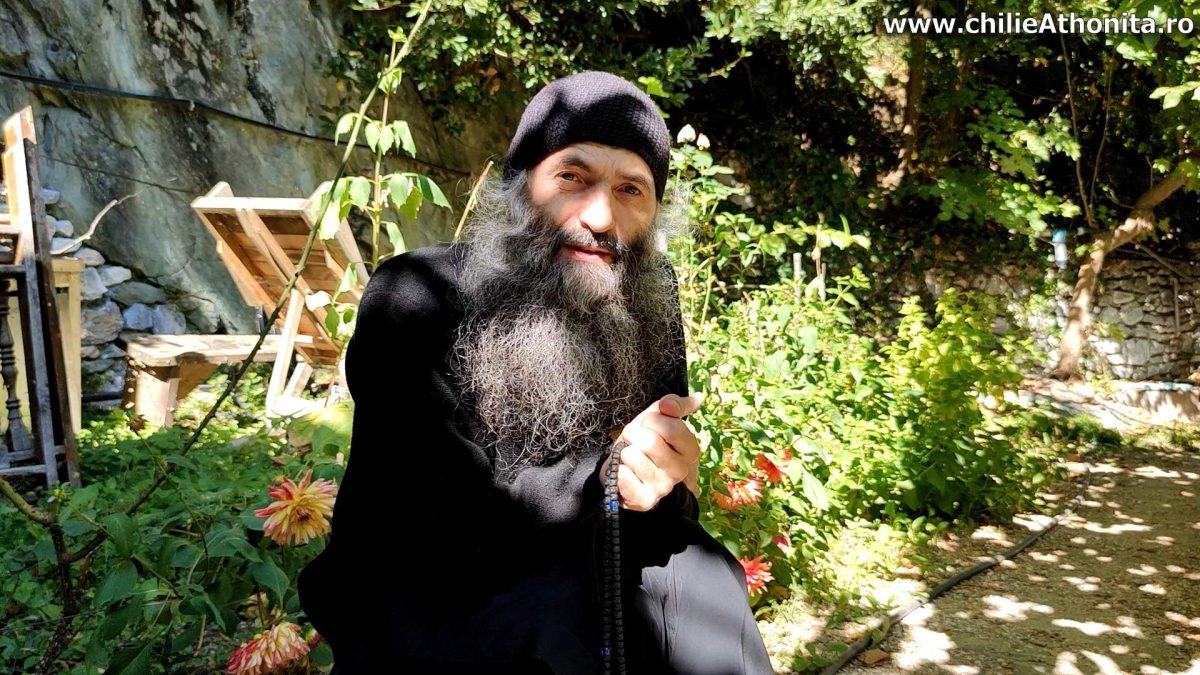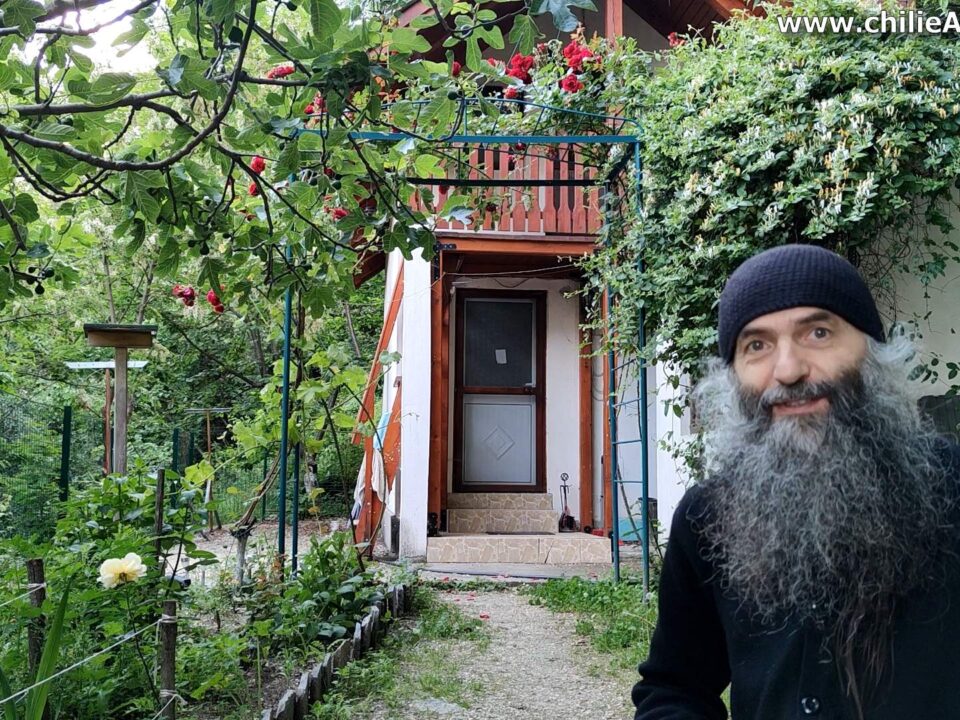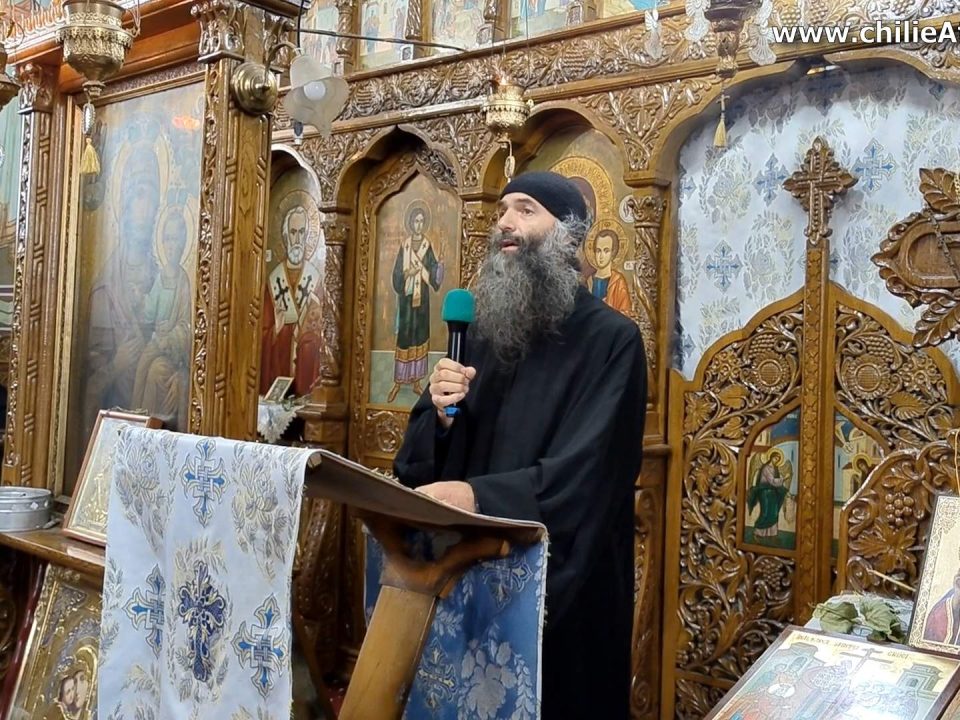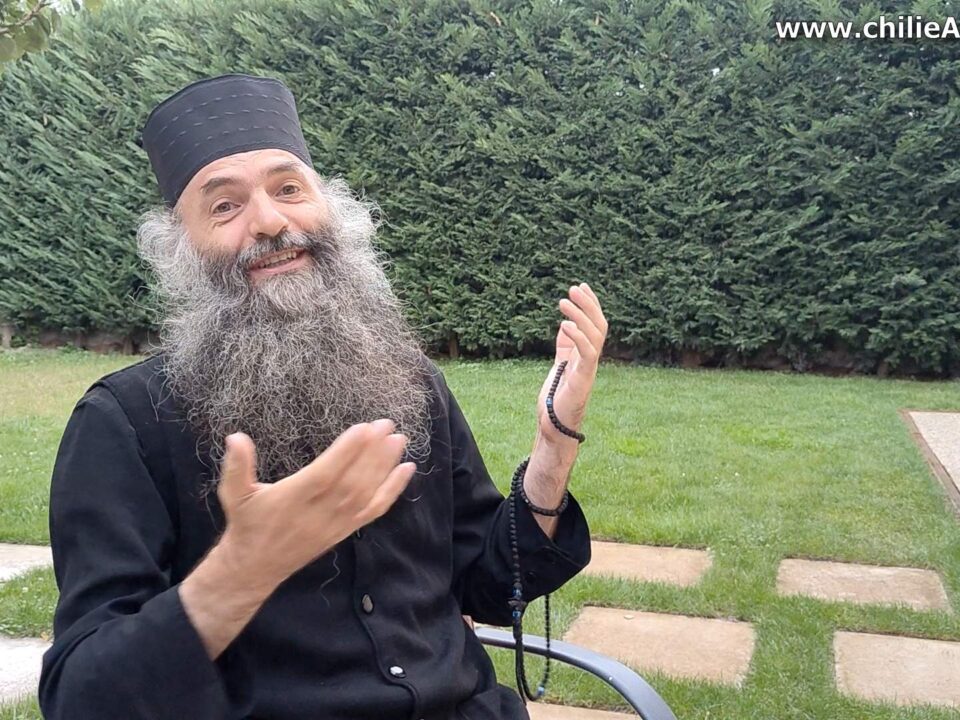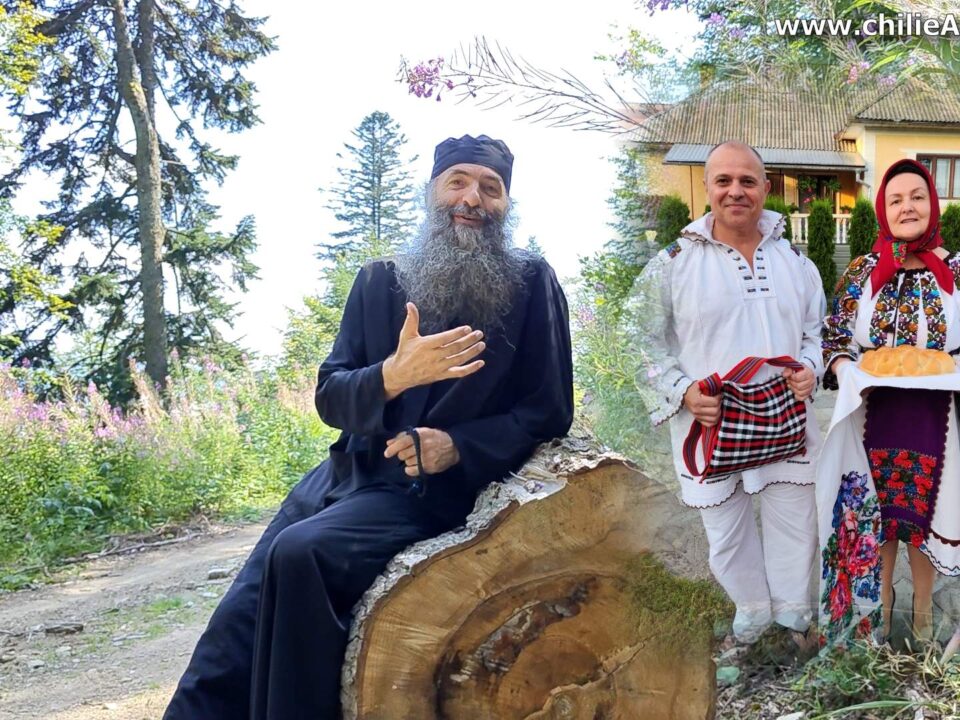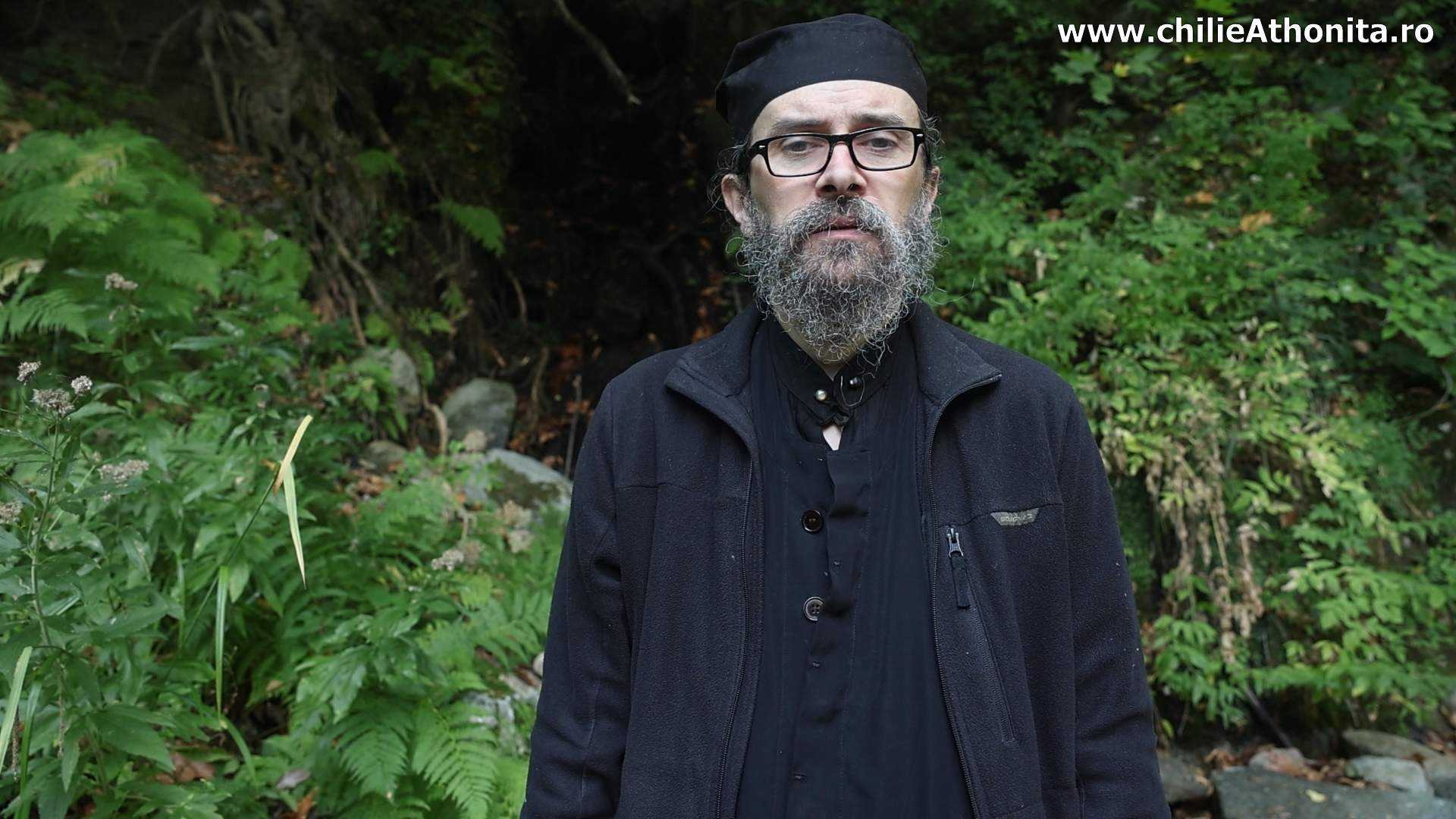
How and Why We Cry – Father Theologos
25 October 2022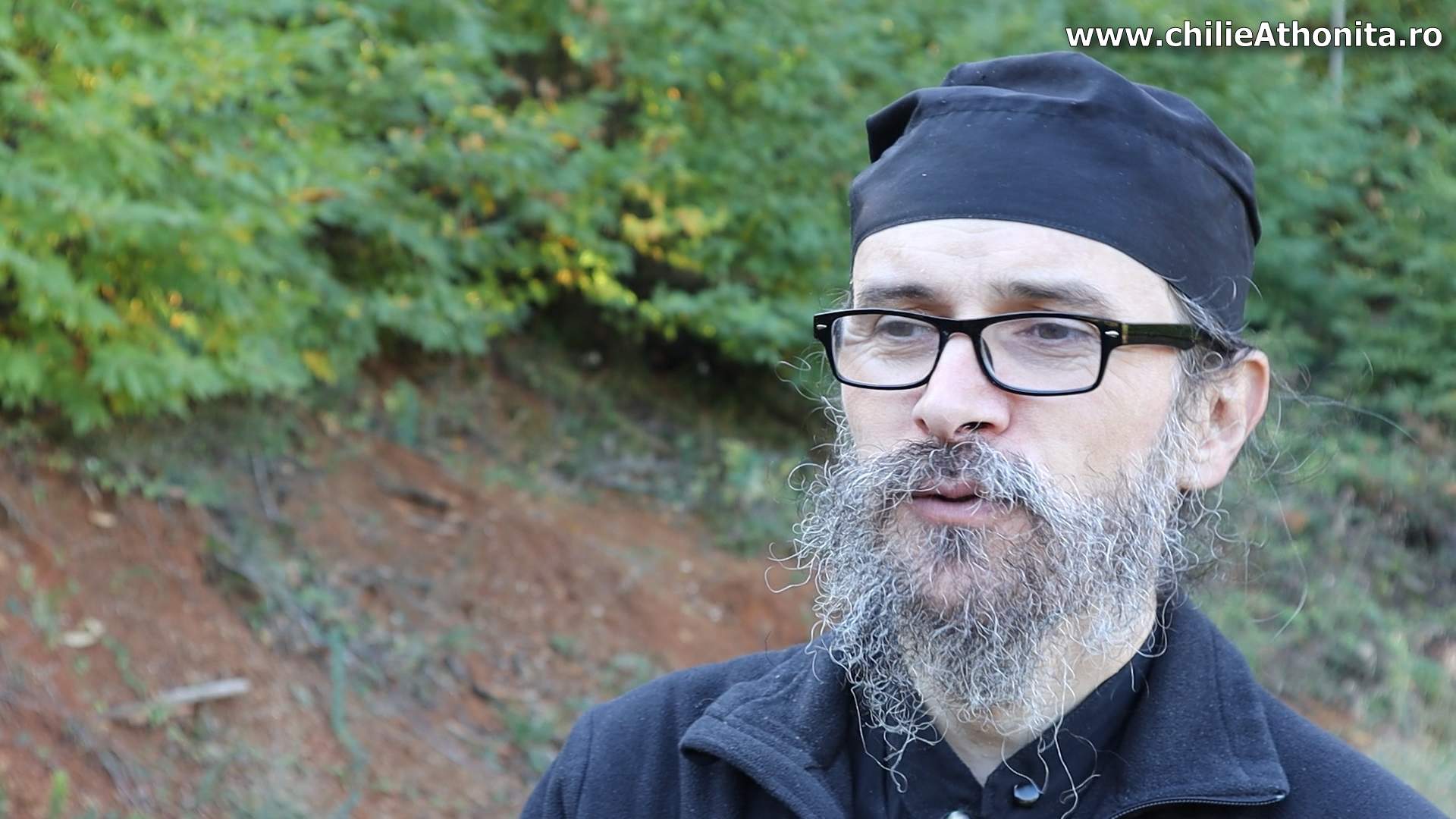
Meekness, Anger and War – Father Theologos
1 November 2022Watch a warm and loving word about one of the most beloved contemporary saints: Saint Paisios the Hagiorite (Athonite). Beyond the briefly narrated life, Father Pimen Vlad tells us in his characteristic style some delightful miracles with Saint Paisios the Athonite.
Enjoy!
Here my dears, we meet again!
What do I want to talk to you about now? About a holy parent, who lived in our times. He had holy life, and even after his passing, he was passed among the saints. I even had an icon here. Take a look: Pious Paisius the Aghiorite.
Who was Pious Paisius the Aghiorite? Hence the name: the aghiorite. There are still many saints, see: Nicodemus the Aghiorite. Aghiorite takes its name those who lived in the Holy Mountain. Aghiorite means of the holy mountain. Here, Pious Paisius of Holy Mountain. The Aghiorite, or we say, the Athonite.
Pious Paisie, I think you all know. His books have been translated into Romanian, the country is full of them. So I think a lot, little, you’ve all heard and know about him. I’m not going to go into many details of his life, but I’m going to describe a few things.
He was born in Cappadocia. Somewhere in Farasa Cappadocia. What does that tell us? Somewhere in Asia Minor. So there is also the homeland of St. Three Hierarchs. In that area of Asia Minor a lot of parents with holy life came out of there. The Pious Porphyrios of which I spoke to you before, the Kavsokalivite, or the Aghiorite. As he says, he lived in the area of Kavsokalyvia, that’s why he was called the Kavsokalivite. Pious Yakov Tsalikis and many others all originated from Asia Minor. And their parents came to Greece with them, little ones. Even just born, so it was in everyone, with the population exchange. And Pious Paisius he was born in 24 and was baptized there. And whom did he have godfather? Again a father with holy life! Which we have on the calendar and we worship him. Saint Arsenius of Cappadocia. He lived in his village there. And he was his godfather, he baptized Pious Paisius. So you see! There was one holiness after another, there.
And says of St. Arsenius, there in Cappadocia that he helped everyone. And Greeks and Turks, he did not take into account. He helped everyone. It kept a place there — there was no doctor in the village, it was a village like that, without super conditions, like that. And he said he kept a place for everything. If someone got sick, that he was a Greek, that he was a Turk: he went, prayed and healed him. It kept place for everything in that village. Well, and immediately after baptism, soon after, then there was already a population exchange in that area, Father Paisie came to Greece. And lived somewhere in Konitsa. He took, as they say a beautiful upbringing, from faithful parents.
He was in the army, he caught that period with the war, however, and after that, many miracles even during the army, it was like that with him, after that he followed the path of monasticism, which he loved very much. came to the Holy Mountain. He lived here for a while. He was named monk here in the St. Mountain, after which he returned to Greece there, where he grew up at Stomiou Monastery. He tried to restore the monastery there, which was more deserted, more like that. And many miracles there too.
He prayed, he troubled, and even described at some point in a place that a hunter was coming about once every week. He came to pray in the church. And after he left there shortly after a gunshot was heard. And Pious Paisius also marveled. Well… once he watched him see what he was doing in the church, that he had the rifle after him always as he was a hunter. And he sees that he goes to the icon of the Mother of God and prays there and says to her: “Mother of God you know that I need food for children.” He had 6, 7, 8 children, how many he had there. And he took oil from the icon of the Mother of God and anointed exactly there, the barrel of rifle with oil from there. And he prayed a little more to the Mother of God and left. And the Pious marveled. He saw what he did, followed him, left, again, shortly after a shot was heard.
And once he calls him aside:
-Tell me, what are you doing? You keep coming permanently and after that I hear the shot!
-Well, parent, look what I’m doing! I need food for my children. See that it’s hard times, famine, as it is. And I always come to the Mother of God and pray to give me food for the children. After I leave the monastery, after lubricating the barrel of the rifle there with oil, a few hundred meters further, at an intersection, comes a deer in front of me. I shoot her and take her home to the children. Every time I come and pray to the Mother of God, I always get a wild deer out there in front of me and it stops. So how the Mother of God gave him food for his little ones. See! For his faith, for his hope in the Mother of God. And Pious Paisius marveled when he saw what his faith was like.
Or it says another time that a more pious woman from the village was coming there. She was coming, helping with work at the monastery, what she could do there. And at some point someone says to Pious Paisius:
— Father, why do you welcome this woman?
— But why?
— Do you think it’s as she looks, godly, that she does, what? Through the village she does a lot of bad things! Lives with the cops around there, I don’t know what…
— And like that, he teased the Pious, then he was still younger as they say: “Well, but wait for a bit, she mocks. I mean, does she make the godly and she goes around with others?” And when she last came, to do, to help with the work through the church, he drove her away. And he said,
— Are you not ashamed, what are you doing this and come here in the house of the Lord??
And the woman left. Well, she left crying.
After the woman had gone away, the father woke up to a flesh struggle that he made him go crazy. He didn’t know anymore. It was as if all hell had encamped on him. A struggle that burnt all his body. “Lord, what have I done, with what have I done?” And because he could not endure this fight anymore, he was afraid of taking it downhill as they say, he had a hatchet, because he still had wood. And he began to cut himself with the axe like this on the leg up here and from one side to the other. To have pain that can calm his body. And that’s how much he cut, that he said, he didn’t feel pain, so much his body was hot. They, and prayer and weeping to the Mother of God, until She was revealed to him, and said to him:
— You couldn’t stand this fight? Here’s this fight this woman has every day! That’s why she falls! You couldn’t stand a few hours.
And then he began to repent. He says:
— God, if this fight is going on this woman and I dared to judge her…
And he repented before God, and dared not judge her any more. That’s why we often judge but do not know each other’s struggle. We judge through our own prism, but we don’t know how God sees these things. We quickly throw away with mud. If someone made a gesture, if anything, we strike and I do not know what. Let’s take care that this thing doesn’t turn against us. Let’s see what it means when we go through this. That it’s easy to judge others, if they made a gesture, put their hands, I don’t know what: “Ready!” End of the world! Let’s look at us! Let’s be more careful. So that God may not allow us such things.
And let’s go further. After that, Pious Paisius struggled a while and went to Sinai. In Mount Sinai, in Egypt. He struggled a year in the wilderness, there was a chapel, a little house with a chapel at St. Galaction and Epistimos. I really got there a few years ago and I took that path and I went and I got to that place where Pious Paisius struggled at the chapel of the Holy Galaction and Epistimos. Great heat there, there was a heat that was drying your saliva — you could no longer, so you permanently needed water. Yes! And he struggled a year there Pious Paisie.
After that he returned to the St. Mountain. He stayed for a while with Pious Tikhon, a Russian father with holy life. He was an apprentice to him. And he even recounts that Father Tikhon never served without tears. And he says: “Many times when he had to go out to the cheruvic, with the Holy Gifts, it took an hour and more, and it did not go out.” And he always repeated the cheruvic, that the parent was in a state of contemplation. What did he see there, in the holy altar, and he could no longer get out? Yes… And after that, he sang there and eventually he also kneeled and the parent came out with the Holy Gifts. Sometimes it took hours of the Divine Liturgy, only the two of them there in the church. You realize, how many mysteries were there? How much joy. How much grace!
After that, later, he passed under obedience, at various monasteries he stayed and then retired to the little cell that remained famous and so many people go there even now — At Panaguda. Panaguda is the name if we say it in Romanian: Most Holy, something like that. So there he struggled many years, many fights, a lot of need, many gifts he received. And he welcomed a lot of people there whom he comforted. I know that once, he wrote somewhere, and a parent who was present at the time said: he came to Father Paisius, that Father Paisius didn’t really welcome anyone overnight at him. Nor did he have room, but he was in his peace. He received guests during the day, had the hours for receiving the people, and the rest sat in prayer. And he welcomed this parent. And that night he made him pray, then to rest a little, and he said,
— See that, we continue the vigil!
And he would wake him up from time to time and say:
— Father, have you not seen a vision?
Father Paisius did not rest all night, he prayed continuously.
Well and until the time of church came; he began to read there at church and at some point he sees Father Paisius, falls face to the ground, worships and then he stayed, he wanted to say something and Father Paisius beckoned to him to be silent. And it felt a scent like that through the church and all the candles started moving . For a long time Father Paisius stood in prayer like that. And after all calmed down, they stopped and the candles after a while. He asked him:
— Father, what was this??
— But haven’t you seen?
— What should I see?
— Mother of God passed here! Because she saw two foolish people who had no sleep here, she gave us a sign and moved the lamps. So you see, often the Mother of God visited Pious Paisius. And he even said: “Every day the Mother of God visits all the monks of Athos to see how they struggle and what they do.” You see, how much care does the Mother of God take of her garden? She takes care of everyone, helps everyone, but I mean here; in her garden. Yes! And so Pious Paisie struggled for a long time.
Wreath of the disease
Then I came to Athos in ’93. Even at that time he was sick. He went to Suroti, he was already there, he had health problems. In the meanwhile he helped a lot: a monastery was made, at Suroti. A monastery of nuns, because the nuns there, during the period when he was certain time sick, in Thessalonica, at surgery; they also helped him. And they were at the beginning then and the father helped them spiritually, with everything he could with the building of the monastery, with its formation. After he got sick, the nuns took him and cared for him there for the last year. And as ill as he was, he received people and comforted them there. He had cancer, he had metastasis, great pain, and many asked him:
— Father, but why don’t you pray to God to heal you?
— Heal me? Well, I’ve been asking God to give me this disease all my life. That’s my wreath. God listens in another way to a sick man when he does not pray for himself— he is praying for others who are in distress.
And so he always prayed and caressed, until he left this world. They buried him there in Suroti. And permanently thousands of people come, every day there, hundreds and thousands of people to worship at his grave and ask for his help. Just recently, the other day, about 3-4 days ago, there came a Greek whom I have known for about 20 years, for many years, from somewhere from the border of Greece. And he came with his boy around here. Among other things he told me:
— Father, look, I built a church in honor of Pious Paisius. Somewhere there on a plot, on a field like that, a place with a bit of a forest, a more secluded place.
It was there only a proschinitar, as they say: a small church so, little, for lighting a candle. 2m wide and 1m long and something. Something tiny. And he says:
— Well, I wanted there, when I saw that it was in honor of Pious Paisie, to make a bigger church to be there. I went to the bishop and asked for approval. He allowed me, but I needed the land, I needed everything. And I went to the town hall further and asked for approval, prayed to Pious Paisius and approved me… I also asked for a piece of land, but they approved me double land there. A larger piece of land. And to make the church, but I didn’t have financial possibilities, as we managed. And I asked for some funds from the town hall. And they refused me. Said that: “We don’t have something like that, I gave you the ground, the farther you can handle it…”
It was then when he began to pray to Pious Paisius. He had an icon in his house painted and as he prayed to Pious Paisie, he prayed in the evening and morning when he woke up, the man well, had his phone close, he grabbed the phone. He saw exactly on the screen, like when you open the phone, some put photos, a picture appears for them there — well, with him was the image of Pious Paisius, the icon that he had on the wall. He had a photo inside, but he had never put it to be that way. So alone it had appeared. And he marvel at how the icon appeared alone there on the phone. When he went to the icon and worshiped, the icon began to bring forth fragrance! Icon on the wall. And a scent of filled the whole room. Then he realized, Pious Paisius will help him and make the church. He said that in a few months, so much he helped them with the chores he had to do, and the money were gathered, everything and he managed to build a beautiful church in honor of Pious Paisius . And he said:
— Look, how wonderful Pious Paisius is. How quickly he helped us and often the icon brings out the fragrance. It fills the whole house with fragrance.
Yes! Pious Paisius. And I’ll add a little more thing here and I’ll end. Some years ago, 7-8 years ago, I went with someone to the monastery, to Suroti. And I didn’t know exactly then how it would be, open or not. But it’s an ordinance: Wednesdays and Fridays it is closed. So no one gets in there. It could also be on Mondays, I don’t know anymore, but Wednesdays and Fridays are for sure. And it is closed, so all day they do not open at all. They somehow have gates about 300-400 m down the road, from there are iron gates, closed everything, fence… And on that day no one comes in. I went; it was Friday. And I got to the gate, quiet, everything closed, nothing. The person I was with had great piety at Pious Paisius. And then he went to the gate like this, and stretched out his hands up and said:
— Pious Paisie, please, do something! I want us to get to your grave to worship you…
And when he finished these words, the gate started alone to part. It opened, I was a few meters further back, quickly, I got into the car, passed by, and behind, after we passed by car, in the yard the gate closed again. And we went upstairs into the yard. Quiet everything, we went to the front of where the entrance to the monastery was, where it was a small gate — that was open too. That if this was closed from below, the rest were open. We went like this, quietly, marveled, nothing around there, and we met in the church a group of priests from Cyprus. Who were coming to worship and had been programmed in advance by phone and to them about an hour before they personally opened the gates to enter and worship. In the rest there was no one. Because it was a closed day. Now when we arrived, so naturally, entering the Church, among them, the nuns there thought we were with their group! They did not realize it. And at some point, we took another path.
We went to his grave, worshiped, that they had worshiped the tomb already. And a nun sees us. She says:
— Are you with the group?
— We are not with the group.
— And how did you get in here??
— Well, look, we came in.
She looked at us that they had not opened the gate to anyone except those parents. And she took a long look at us. I say:
— The Pious has ordained!
— Okay, if you worshiped, look, in 10 minutes the parents will leave. (they had a minibus, there were several of them) We’ll open the gate, follow them and you go out at once.
And that’s how we went out after we worshiped. So Pious Paisius had opened the door to us for the faith of the other person. Because he wanted very much. Pious Paisie works a lot of miracles! He helped as long as he was alive and helps even now, to those who pray with faith. To those who reach his grave, so let us pray to him, that he never leaves us. He had one more thing when he lived in life: from 12.00 at night to 02.00 he prayed for those who do not pray. For those who have fun, for those who are drugged, for those who are in clubs, he prays. That he said that for them no one prays, nor do they pray. And many cases were when he saved others, a young man at night was walking like this, at speed, with his moped. And a truck came out in front of him. So, in fact, it was the truck in front, but it braked. And he got into the truck with full speed… and at the moment of impact he saw a parent taking him in his arms. The moped got wrecked, and he was left whole on the asphalt standing. But he got to see the face of the parent. And after years, still asking around, he reached the Pious. When he saw him he said:
— He saved me!
He lived, Pious Paisius was alive at that time. He prayed for them, and God knows by what form, perhaps the angel, or who was, in his image saved that young man. So he helped even then and helps now too. Pray to him and always ask for his help! And he will always help you! Let Pious Passion help us and of course the Mother of God, who is our Empress, of all of us and to always watch over us. God help us!
Online commemoration lists and donations
May the Lord help us!
Online Commemoration Lists and Donations
May the Lord help us!
If you have a bank card and wish to send commemoration lists and donations online using your card, and/or to support our philanthropic activity, including this site, please fill out the form below to make a small donation. The form is secure – we use Stripe for payment processing – a world leader in this field. We do not collect your personal data.
If you do not have a card, or do not wish to use it, visit the webpage for Online Donations and Commemoration Lists.
We will pray for your loved ones! (Please do not include inessential details like wishes, degree of kinship, introductions etc. JUST the name!)
Especially for recurring commemoration lists, we ask that you please keep them to under 20 names long. If you include a member of the family, we add “and for their families.”


